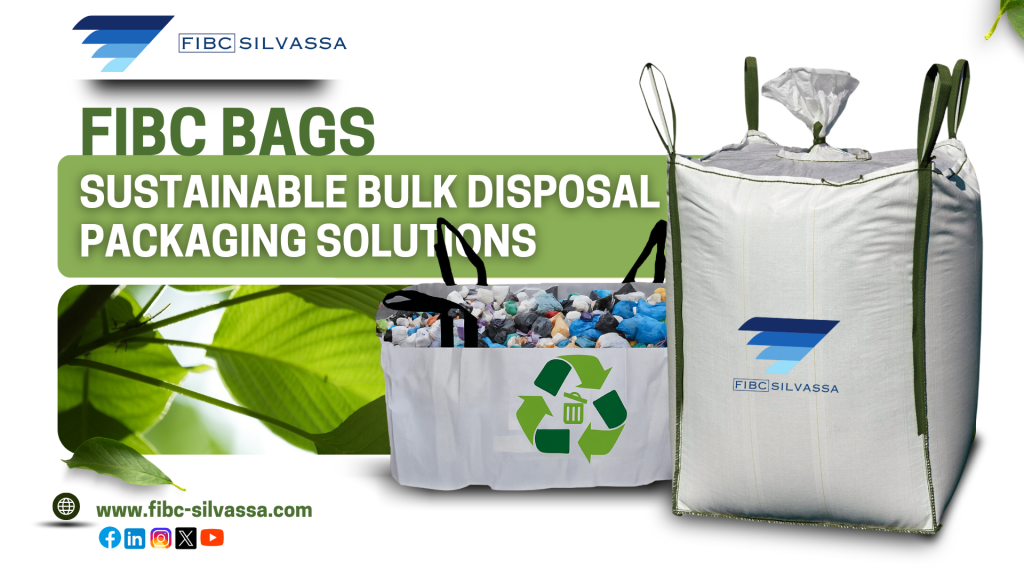
FIBC Bags: Sustainable Bulk Disposal Packaging Solutions
Sustainable Bulk Disposal Packaging Solutions refer to eco-friendly methods and materials used for storing, handling, and transporting large quantities of disposable or recyclable materials. These packaging systems focus on reducing environmental impact through durability, reusability, and recyclability. Among these solutions, FIBC Bags (Flexible Intermediate Bulk Containers) have emerged as a leading choice. Constructed from woven polypropylene fabric, they not only provide a strong and flexible structure but also offer a sustainable way to manage bulk materials responsibly.
Additionally, their ability to handle heavy loads efficiently makes them an essential part of modern industrial packaging practices. Therefore, many industries prefer these containers for their durability, reusability, and eco-friendly performance.
What Are FIBC Bags?
Also known as bulk bags or jumbo bags, these are large, durable containers designed for the storage and transportation of dry bulk materials. Furthermore, their high load capacity, lightweight design, and reusability make them an excellent alternative to traditional packaging solutions.
Moreover, these bags are made from polypropylene fabric, which makes them resistant to tearing, moisture, and UV exposure, ensuring long-lasting performance even in demanding industrial environments.
Benefits of Using Reusable Bulk Bags
1. Recyclable and Eco-Friendly
These flexible bulk containers are made from recyclable polypropylene material, reducing dependency on single-use packaging. Once their service life ends, the fabric can be reprocessed into new products, thereby supporting the circular economy.
2. Reusable with Long Service Life
With proper handling, the bags can be reused multiple times without compromising quality. Consequently, this minimizes the volume of packaging waste generated across various industries, supporting sustainable and cost-efficient packaging practices.
3. Cost-Efficient for Bulk Disposal
In addition, their large capacity reduces the need for multiple small containers, cutting down on transport costs and improving overall efficiency in material disposal operations.
4. Lower Carbon Footprint
Because of their lightweight yet high-volume design, these containers reduce transportation frequency and associated emissions—making them a low-carbon packaging option for sustainable industries.
Applications Across Industries
FIBC-based packaging is widely used in industries where large-scale material handling and sustainable disposal are crucial. For instance, they serve vital roles in:
- Construction and Infrastructure – For managing bulk raw materials and residual products.
- Agriculture and Horticulture – For safe storage and transport of grains, seeds, and organic materials.
- Recycling and Material Recovery Units – For efficient handling and segregation of recyclable materials.
- Manufacturing and Mining – For transporting by-products and maintaining safe material disposal processes.
Thus, these applications demonstrate the adaptability of the packaging solution across diverse sectors.
Different Types of Bulk Bags for Material Handling
Standard FIBC Bags: Basic design for dry, non-hazardous materials. Ideal for general industrial and agricultural use.
Baffle / Q-Bags: Maintain a square shape after filling to save storage space, improving storage and transportation efficiency.
Ventilated FIBC Bags: Allow air circulation to prevent moisture build-up, suitable for agricultural and organic materials.
UN Certified FIBC Bags: Meet UN standards for hazardous materials, ideal for chemical and pharmaceutical sectors.
Each bag type contributes to sustainable packaging by optimizing space, safety, and environmental performance. Moreover, their versatility ensures suitability across a wide range of disposal and recycling needs.
Eco-Friendly Benefits of Bulk Packaging
- Reduced Plastic Waste: Their reusability prevents excess packaging waste from entering landfills.
- Recyclability: 100% polypropylene composition supports recycling programs effectively.
- Energy Efficiency: Less material production and fewer transport trips save energy resources.
- Compliance with Sustainability Goals: Many FIBC manufacturers align with ISO and environmental standards for responsible production.
By incorporating these containers into bulk handling systems, companies achieve both economic and environmental advantages.
Selecting the Right FIBC Manufacturer
To ensure quality and sustainability, it is essential to choose a manufacturer that offers:
- ISO-certified production standards
- Use of virgin and recycled polypropylene materials
- Custom bag designs suited for disposal or recycling applications
- Eco-conscious production methods
Furthermore, a reliable supplier ensures product consistency, compliance, and environmental responsibility throughout the entire packaging lifecycle.
Conclusion
In conclusion, FIBC Bags are redefining the concept of sustainable bulk disposal packaging. Their reusability, strength, and recyclable properties make them a key component of environmentally responsible material management. As industries worldwide continue to prioritize sustainability, adopting these packaging solutions not only supports efficient bulk handling but also promotes a cleaner and greener future. With a strong global presence across major countries such as the USA, Canada, Germany, the UAE, Australia, South Africa, Brazil, the UK, Saudi Arabia, and Türkiye, FIBC Silvassa is recognized as a trusted supplier of environmentally responsible bulk packaging solutions. Ultimately, FIBC Bags from FIBC Silvassa are more than packaging they are a long-term investment in sustainability, operational efficiency, and responsible material management.
